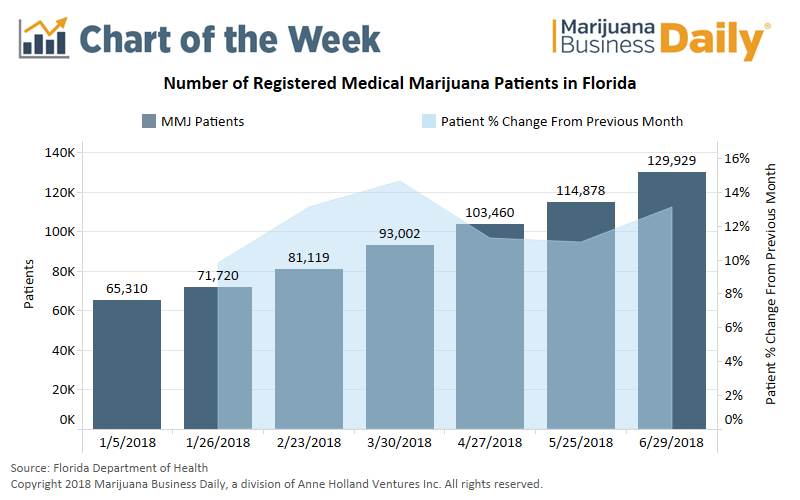Connecticut’s medical marijuana growers and retailers are at loggerheads over the state’s plan to expand its MMJ program to meet growing consumer demand for products.
The state has proposed adding up to 10 more dispensaries to serve Connecticut’s growing patient pool, an increase that would more than double the number of retailers.
But some dispensary owners are instead calling on the state to add more cultivation licenses, arguing they don’t have access to enough product to meet growing demand.
Dispensary sales this year are projected to reach $50 million-$75 million, up from an estimated $30 million-$35 million in 2017, according to the Marijuana Business Factbook 2018.
Much is at stake. Retailers fear that with additional storefronts the supply strain could worsen unless more growers are added, a situation that could erode their bottom line.
Growers don’t want to see added competition, fearing their own sales would take a hit.
“Everybody’s pretty happy with the way things have grown,” said Laurie Zrenda, dispensary manager at Thames Valley Relief in Uncasville. “Trying to keep up with it now is the challenge.”
State acts to serve growing patient pool
Here’s the background behind the current situation:
- Connecticut’s MMJ program has developed at a steady rate since state lawmakers approved medical cannabis sales in 2012.
- Sales began in 2014, and regulators initially approved six dispensary licenses before increasing the total to the current nine in 2016.
- The patient count followed suit, shooting up to 26,652 patients registered for the program at the end of June, according to the state.
And here are steps being taken by the state to address burgeoning demand:
- To help get medical marijuana to the patients who need it, the Connecticut Department of Consumer Protection began taking applications at the beginning of the year for an additional three to 10 dispensaries.
- Regulators are reviewing 73 applications, with a plan to award the winners this fall.
If more storefronts open, presumably in more remote areas of the state that lack easy access to dispensaries, more patients will likely sign up for the program and boost MMJ sales.
The state allows for a wide range of products to be sold in stores, from flower to vaporizer pens to oils and lotions.
Medical cannabis can be recommended for 22 medical conditions. State regulators are discussing adding seven more conditions to the list.
The state’s Board of Physicians recently rejected adding opioid addiction as a treatable condition.
Cultivators don’t have any caps on square footage or canopy size.
According to Lora Rae Anderson, spokeswoman for the state’s consumer protection department, the four cultivators have either expanded their grows to meet demand or plan to expand to larger facilities.
“At this time, we’re comfortable that the cultivation facilities can meet the demand,” Anderson said.
Retailers want more supply
Store owners have been complaining since 2015 about a lack of consistent supply. A group of dispensary owners approached the state in February 2018 to appeal for another grower to be added.
While the common THC-heavy flower supply has been stronger, it’s the other products retailers say aren’t always available. Most shortages occur in CBD-focused products.
“There’s not a consistency in some of the medications that patients have gotten accustomed to using,” said Geri Ann Bradley, owner of The Healing Corner dispensary in Bristol.
Zrenda at Thames Valley Relief said she’s been asking for another cultivator for a long time.
She’s been out of CBD-heavy flower for about a month.
When Zrenda runs out of a particular product, she typically tries to find a substitute. But if she doesn’t have any CBD products, she’s at a loss.
“That’s when it becomes difficult,” she said. “It’s easy to pick one sativa for another and give something new a try, but not if you don’t have the CBD product people want.”
Still, Zrenda believes the overall supply has been better lately. Growers have learned what products are popular.
“They know what people are looking for and are getting better at reading that sort of thing,” she said. “It’s not all terrible.”
Growers stay the course
From one grower’s perspective, the move to add more retail outlets is welcome.
“I don’t see there being a product shortage with the addition of more dispensaries,” said David Lipton, managing partner and CEO of Advanced Grow Labs in West Haven.
He said his grow facility has expanded from 26,000 square feet to 41,000 square feet with room to add another 20,000 square feet.
Prices have gone down as producers expand and become more efficient, he said. When he started sales in 2015, a wholesale pound of flower would bring $4,000. Now it sells for $2,500-$3,000 a pound.
Lipton said one of his toughest tasks from Day One was to develop and produce a lot of products beyond flower.
“It’s not a state like Colorado where there are thousands of companies making these products,” he said. “It’s done by the four of us, and I think we’re all executing incredibly well.”
Linda Kowalski, a lobbyist and spokeswoman for the four cultivation companies, emailed a statement to Marijuana Business Daily saying, “As the program has grown, the four licensed producers have spent tens of millions of dollars to expand their facilities to meet the increasing demand for the product.”
Bart Schaneman can be reached at barts@mjbizdaily.com





